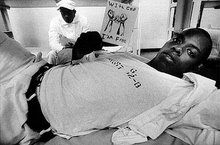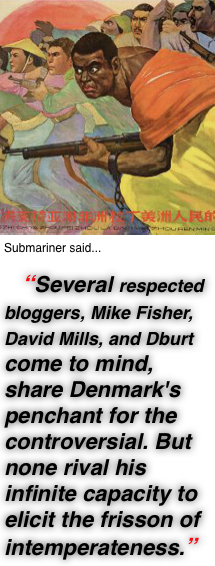

The informant who ensnared the four Bronx terror suspects was the guy nearly everyone else at their Newburgh mosque had the common sense to avoid.
Driving a silver Hummer or black Mercedes-Benz, Shahed (Malik) Hussain arrived at the Masjid al-Ikhlas mosque Friday mornings and stayed for hours in the parking lot trying to chat up those who seemed to be down on their luck.
He offered meals, jobs and advice on how to get rich. "If you need anything, just let me know," Hussain, 52, would say, according to people approached by him. He was friendly. Too friendly.
And that's what made everyone nervous. "We would go to the person after he talked to them, and tell them to stay away," worshiper Shafeeq Abdulwaly, 39, said. James Cromitie, accused ringleader of the gang bent on bombing Riverdale synagogues and shooting down a plane, didn't listen - possibly seduced by Hussain's bankroll.
"James for some reason didn't stay away from him," Abdulwaly said. "James had no money. The longer James stayed and spoke to him, the more money James had."
The Doc, aka Dat Nucka said...
 Read something in Rolling Stone about this. Essentially what we have now is a situation where the budgets for these protective agencies are off the charts, a residual effect of post 9/11 paranoia and fear, and now those in charge have to justify such exorbitant sums. So instead of seeking out real terror plots, they invent them. They'll find say, a young muslim kid and illegally probe through his email and online activities. And if he mentions something anti-semitic, they figure he's just the man they need. (Or hell sometimes even if he doesn't.) So they get a guy to go to him, throw some big sum of money in his face and push him into some crazy terror plot that he otherwise would have neither the inclination or the resources to carry out. Boom, InstaTerrorist, just add water.
Read something in Rolling Stone about this. Essentially what we have now is a situation where the budgets for these protective agencies are off the charts, a residual effect of post 9/11 paranoia and fear, and now those in charge have to justify such exorbitant sums. So instead of seeking out real terror plots, they invent them. They'll find say, a young muslim kid and illegally probe through his email and online activities. And if he mentions something anti-semitic, they figure he's just the man they need. (Or hell sometimes even if he doesn't.) So they get a guy to go to him, throw some big sum of money in his face and push him into some crazy terror plot that he otherwise would have neither the inclination or the resources to carry out. Boom, InstaTerrorist, just add water.
















































































































5 comments:
Using informants to gin up terrorist conspiracies is a radical departure from the way the FBI has traditionally used cooperating sources against organized crime or drug dealers, where a pattern of crime is well established before the investigation begins. Now, in new-age terror cases, the JTTFs simply want to establish that suspects are predisposed to be terrorists -- even if they are completely unable or ill-equipped to act on that predisposition. High-tech video and audio evidence, coupled with anti-terror hysteria, has made it effectively impossible for suspects to use the legal defense of entrapment. The result in many cases has been guilty pleas -- and no scrutiny of government conduct.
In most cases, because no trial is ever held, few details emerge beyond the spare and slanted descriptions in the indictments. When facts do come to light during a trial, they cast doubt on the seriousness of the underlying case. The "Albany Pizza" case provides a stark example. Known as a "sting case," the investigation began in June 2003 when U.S. soldiers raided an "enemy camp" in Iraq and seized a notebook containing the name of an imam in Albany -- one Yassin Aref. To snare Aref, the JTTF dispatched a Pakistani immigrant named Shahed "Malik" Hussain, who was facing years in prison for a driver's-license scam. Instead of approaching Aref directly, federal agents sent Malik to befriend Mohammed Hossain, a Bangladeshi immigrant who went to the same mosque as Aref. Hossain, an American citizen who ran a place called Little Italy Pizzeria in Albany, had no connections whatsoever to terrorism or any form of radical Islam.
After the attacks on 9/11, he had been quoted in the local paper saying, "I am proud to be an American." But enticed by Malik, Hossain soon found himself caught up in a government-concocted terror plot. Posing as an arms dealer, Malik told Hossain that a surface-to-air missile was needed for an attack on a Pakistani diplomat in New York. He offered Hossain $5,000 in cash to help him launder $50,000 -- a deal Hossain claims he never properly grasped.
According to Muslim tradition, a witness is needed for significant financial transactions. Thus, the JTTF reached out for Hossain's imam and the true target of the sting -- Aref.
It's not that radical a departure. The federal government figured out during e war on drugs that it was much easier to get a conspiracy conviction, which typically carries the same punishment, than to get a conviction for the actual commission of the crime. All that was needed was the testimony of a co-conspirator and presto, instant conviction. As they were already accustomed to using paid informants to get them close enough to catch an actual crime in progress, they now simply switched the focus to having the informant testify as to how the target was involved in the crimes; crimes that only the informant had admitted to committing.
It is ingenious really. What this told them was that it wasn't necessary for them to actually prove that a crime had been committed, just get someone to say they had committed a crime, and then implicate others in that crime. This worked so well to get the drug lords and gangsters, it was recently used to get the highest profile Black athlete in the world, and you should expect to see even more of this tactic applied in ever expanding areas of "crime-fighting".
And this is simply a logical outgrowth of criminal court system's S.O.P. for handling criminal cases. A court system, predicated on the right to fair trial by jury, that actually has trials for a very small percentage of those accused of crimes. Confronted with dockets bursting at the seams with all the arrests (bogus and otherwise) during the height of drug war frenzy, prosecutors and judges colluded to make extortion, also known as plea bargaining, a common everyday occurrence in the halls of "justice".
coupled with advances in social network surveillance, that's some hellified evolution in governance "best practices"...,
Read something in Rolling Stone about this. Essentially what we have now is a situation where the budgets for these protective agencies are off the charts, a residual effect of post 9/11 paranoia and fear, and now those in charge have to justify such exorbitant sums. So instead of seeking out real terror plots, they invent them. They'll find say, a young muslim kid and illegally probe through his email and online activities. And if he mentions something anti-semitic, they figure he's just the man they need. (Or hell sometimes even if he doesn't.) So they get a guy to go to him, throw some big sum of money in his face and push him into some crazy terror plot that he otherwise would have neither the inclination or the resources to carry out. Boom, InstaTerrorist, just add water.
A radical departure? Have you ever heard of COINTELPRO?
http://video.google.com/videoplay?docid=3729458480013375211
Numerous Black Americans are dead or in jail as a result of the actions of the FBI’s agent provocateurs of the 1960s and 1970s.
Post a Comment